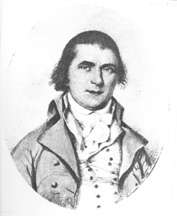Andrew Moore (politician)
Andrew Moore (1752 – April 14, 1821) was an American lawyer and politician from Lexington, Virginia. Moore studied law under George Wythe and was admitted to the bar in 1774.[1] He rose to the rank of captain in the Continental Army during the American Revolutionary War, seeing action at Saratoga. After the war he was eventually commissioned a major general in the Virginia militia in 1803. He was a delegate to the Virginia convention that ratified the United States Constitution in 1788. He was a member of the Virginia legislature from 1791–1789 and 1799–1800.[1] He represented Virginia in both the U.S. House (1789–97, 1804) and the U.S. Senate (1804–1809).
Andrew Moore | |
|---|---|
 | |
| United States senator from Virginia | |
| In office August 11, 1804 – December 4, 1804 | |
| Preceded by | Wilson C. Nicholas |
| Succeeded by | William B. Giles |
| In office December 4, 1804 – March 4, 1809 | |
| Preceded by | William B. Giles |
| Succeeded by | Richard Brent |
| Member of the U.S. House of Representatives from Virginia's 5th district | |
| In office March 5, 1804 – August 11, 1804 | |
| Preceded by | Thomas Lewis, Jr. |
| Succeeded by | Alexander Wilson |
| Member of the U.S. House of Representatives from Virginia's 2nd district | |
| In office March 4, 1793 – March 4, 1797 | |
| Preceded by | John Brown |
| Succeeded by | David Holmes |
| Member of the U.S. House of Representatives from Virginia's 3rd district | |
| In office March 4, 1789 – March 3, 1793 | |
| Preceded by | Position established |
| Succeeded by | Joseph Neville |
| Personal details | |
| Born | 1752 Rockbridge County, Virginia |
| Died | April 14, 1821 (aged 68–69) Lexington, Virginia |
| Political party | Democratic-Republican |
| Military service | |
| Branch/service | Continental Army Virginia Militia |
| Rank | Major General |
| Battles/wars | American Revolutionary War Battle of Saratoga |
Electoral history
- 1789; Moore was elected to the U.S. House of Representatives with 84.16% of the vote, defeating Independent George Hancock.
- 1790; Moore was re-elected unopposed.
- 1793; Moore was re-elected unopposed.
- 1795; Moore was re-elected unopposed.
gollark: I use them consistently, be ee eee eeeee.
gollark: Also user IDs.
gollark: Also usernames.
gollark: We have different profile pictures.
gollark: Distinguish better.
References
- Tyler, Lyon Gardiner (1915). ENCYCLOPEDIA OF VIRGINIA BIOGRAPHY, Volume II. pp. 88–89.
External links
| U.S. House of Representatives | ||
|---|---|---|
| Preceded by Position established |
Member of the U.S. House of Representatives from Virginia's 3rd congressional district 1789–1793 |
Succeeded by Joseph Neville |
| Preceded by John Brown |
Member of the U.S. House of Representatives from Virginia's 2nd congressional district 1793–1797 |
Succeeded by David Holmes |
| Preceded by Thomas Lewis, Jr. |
Member of the U.S. House of Representatives from Virginia's 5th congressional district 1804 |
Succeeded by Alexander Wilson |
| U.S. Senate | ||
| Preceded by Wilson C. Nicholas |
U.S. senator (Class 2) from Virginia 1804 Served alongside: William B. Giles |
Succeeded by William B. Giles |
| Preceded by William B. Giles |
U.S. senator (Class 1) from Virginia 1804–1809 Served alongside: William B. Giles |
Succeeded by Richard Brent |
This article is issued from Wikipedia. The text is licensed under Creative Commons - Attribution - Sharealike. Additional terms may apply for the media files.

